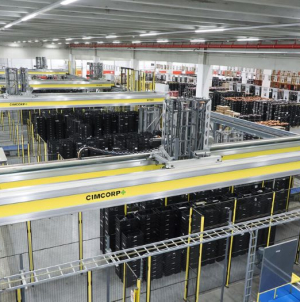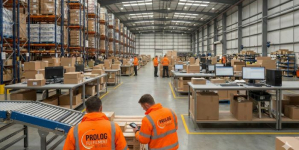-
Rite-Hite unveils new range of hydraulic kits to upgrade and extend dock leveller performance - 1 day ago
-
REWE and Cimcorp automate fresh supply chain for Berlin supermarkets and stores - 1 day ago
-
Q1 – A recovery period or time to fix, switch and scale? - 1 day ago
-
NULOGY’S SHOP FLOOR SOFTWARE TO POWER COMPLETE CO-PACKING’SOPERATIONS - February 13, 2026
-
Why lead generation depends upon good content - February 13, 2026
-
Wallapop and Albatross Sign Strategic Partnership to Bring Real-Time AI Discovery to the Future of Consumer-to-Consumer Commerce - February 12, 2026
-
Thorworld ramp helps Hubergroup to streamline its unloading operation - February 6, 2026
-
TRACKER INNOVATION FROM QUECLINK TO BOOST STOLEN VEHICLE RECOVERY PERFORMANCE - February 4, 2026
-
Flexi Narrow Aisle hits 50! - January 29, 2026
-
DERRY BROS ATTRACTS RECORD NUMBERS OF FREIGHT CUSTOMERS SEEKING CUSTOMS SUPPORT - January 29, 2026
Cobots in action for optimal sound experience.
Collaborating robot applications improve headphone production at Beyerdynamic
Beyerdynamic is one of the few premium audio device manufacturers to fabricate its products almost exclusively in Germany, and primarily by manual work “made in Germany”. However, the reputation and trust which not only this
respected quality seal, yet also the company itself enjoy with customers around the world come with high expenses as regards manufacturing. While other giants in the sector have meanwhile relocated parts of their production to Asia,
this long-established company, founded in 1924, searched for a possibility to continue profitable production at home in Germany for years to come. The audio device manufacturer set an ambitious goal for itself: to increase productivity by
50 percent while keeping capacities stable and at the same time remaining sight of the brand’s high quality standards. Collaborative robots have now successively begun supporting Beyerdynamic employees in various processes for the successful implementation of this strategy in the framework of a four year plan. In a pilot project, the electronics manufacturer is using a solution from Universal Robots and Robotiq in the production area. In a first application, today
two cobots are supporting the employees in headphone fabrication. Thanks to this first robot application, human-robot collaboration has already increased productivity within the automated process by 50 percent while also increasing
the quality of the finished premium headphones.
Human-robot collaboration improves the coating process
Beyerdynamic has always attached great importance to flexibility when manufacturing its products and therefore relies on a high level of hand work. The long-established company was founded in Berlin in 1924 as “Elektronische Fabrik Eugen Beyer” to produce movie theater speakers for the emerging talking films. That company, which was originally named after its founder, laid the ground for today’s Beyerdynamic GmbH, which has been located in Heilbronn since 1948 and is today one of the world’s leading manufacturers of headphones, microphones and conference systems.
Process stability has always been the crucial factor in the production of high quality audio devices, particularly when carrying out precision work. However, so far it had never been possible to guarantee this stability for certain delicate steps within the headphone production which were traditionally carried out by hand. For example, in one step in the production sequence the loudspeaker membranes have to be treated with a dispersion agent coating. Before this process was automated, no less than three employees who applied the medium to the membrane by hand with a brush were responsible for this manufacturing step. “Naturally, it is impossible for a human always to ‘paint’ evenly over a long period of time. At some point, one stroke of the brush will be thicker, and another thinner. Our membranes consequently displayed strong fluctuations in terms of quality,” says Jörg Lang, Process And Quality Manager in the
Heilbronn production facility. As a result, the company saw this step as a suitable starting point for optimizing its manufacturing processes by using collaborative robots.
The resulting partial automation solution was intended to reduce the quality fluctuations while increasing the procedure’s productivity.
The company felt that traditional industrial robots were not suited for this job because of the comparatively high costs associated with their purchase and integration and also because of their high space requirements. At the same time, the electronics manufacturer had already made good experience with the UR3 and UR5 cobots from Universal Robots. Peter Härtel, Head of Strategic Operations and Quality at Beyerdynamic, reports: “Originally, we bought the UR robots for our quality tests. They are safe, suitable for flexible tasks, and easy to program for constantly changing jobs,
which means that we can use them to conduct all conceivable tests. That gave us the idea to also deploy the robots directly next to our employees in manufacturing.” Today a UR3 and UR5 are collaborating with our three employees in membrane coating. As a result, the manufacturing process is now stable and produces consistently high quality. And while the robots take over the repetitive jobs, today the workers can concentrate on activities that add more value. In addition, productivity at this step has increased by 50 percent.
Robots in the middle of the production line
In order to automate the coating of the speaker membranes using the two UR cobots, this process was first split into two tasks: Handling and spraying. For the handling step, a UR5 robot arm is equipped with an integrated Robotiq wrist camera as well as a Robotiq 2-finger gripper. In a first step, a worker positions a welded headphone speaker onto a predefined green surface which represents the field of vision of the camera integrated into the application. This allows the handling robot to register the workpiece and pick up the speaker. It then places the component onto a rotary motor.
At this point, a UR3 with an integrated spray gun begins the spraying process and coats the membrane by spraying it with the dispersion agent. The UR5 then uses the Robotiq gripper to place the coated loudspeaker onto a tray which the robot automatically pushes forward once it is full. For seamless work, the robots communicate with each other by exchanging data and independently giving each other the necessary clearances for whichever step is next in line.
Flexible applicability thanks to Plug&Play
The lightweight robots from Universal Robots convince Beyerdynamic by their flexible range of applications and intuitive usability combined with low space requirements. “In particular, the fact that the robots are extremely simple to program was crucial when we selected Universal Robots. We can program our applications ourselves, without
having to depend on external service providers,” explains Peter Härtel. “Thanks to the intuitive control, our employees can quickly learn how to handle the robots themselves.
The UR robots also offer an unbeatable price-performance ratio.” Jörg Lang adds, “The Robotiq camera and gripper were also swiftly installed and ready to work seamlessly thanks to the software and programming environment. This Plug&Play integration with the UR robot arm and Robotiq attachments allowed us to implement our pilot project
in no time at all.”
Meeting the cobots
The new robot colleagues were very quickly fully integrated from both a technical point of view as well as with respect to the workforce at Beyerdynamic, and were recently even given the nicknames “Jonathan” and “Fritzchen”. “Initially our employees were still somewhat skeptical about the cobots. After all we were entering uncharted territory with introducing the UR robots to our production area. Consequently no one could imagine how human-robot collaboration would turn out in practice and what changes it would bring to our process chain,” explains Wolfgang Luchkardt Managing Director of Beyerdynamic. “This is why we put emphasis on communicating openly right from the start in order to dispel any doubts. We also made ‘teamwork’ with the cobots voluntary for our employees and asked who would be interested in taking part in the project.” Gülhan Boz, one worker who came forward, is satisfied with her new robotic colleagues. “We get along very well with ‘Jonathan’ and ‘Fritzchen‘. It was easy for us to learn how to operate the robots correctly. Even if a malfunction occurs, we can easily remedy it ourselves.”
In order to assuage any possible fears regarding contact with the UR robots, one of the cobots was programmed to mix cocktails for the company’s summer party, even before the units started their work in the plant. “This ‘just for fun’ application showed everyone how directly and safely the UR robots fit into a human environment,” says
Härtel. “Our employees’ curiosity very quickly won out and they immediately warmed up to the robots.”
Helpers for sustainable quality: “made in Germany”
Beyerdynamic stands for German workmanship and quality in audio electronics.
Thanks to its cobot application and the accompanying increase in productivity and quality, today the traditional brand is in a position to continue producing completely in Germany for years to come. But according to Managing Director Wolfgang Luckhardt, the success achieved so far by using automation is only the beginning: “Naturally we are aiming at growth for the future, and consequently at a further increase in our productivity and an unprecedented quality index with regard to our products. This is necessarily a long-term and dynamic process, and we are firmly committed to the use of additional robots in other production areas.”

































